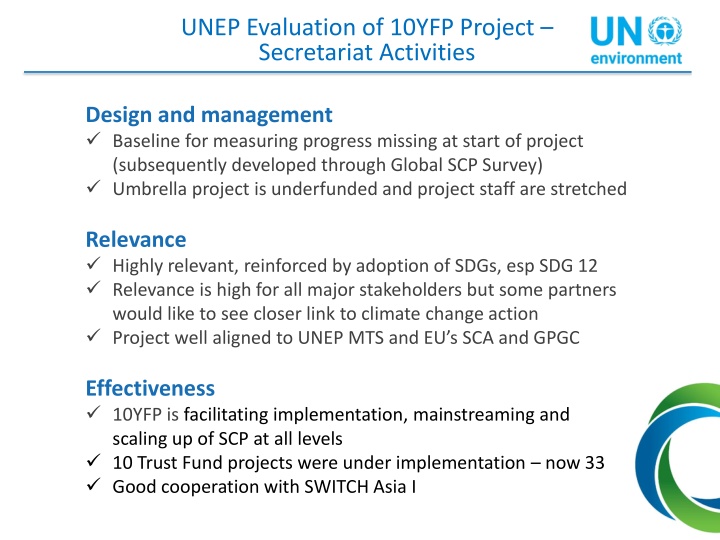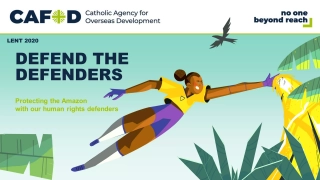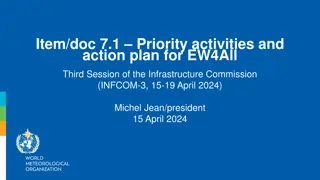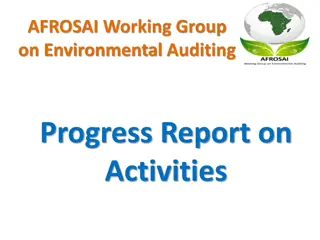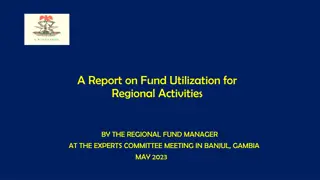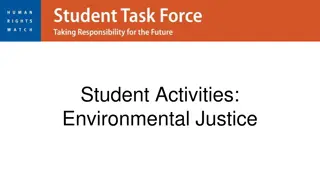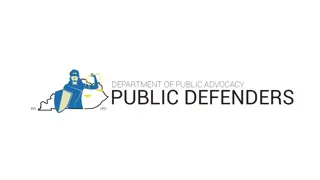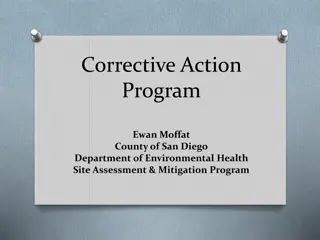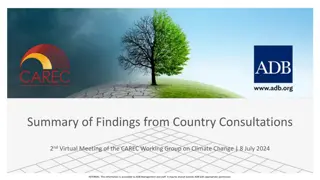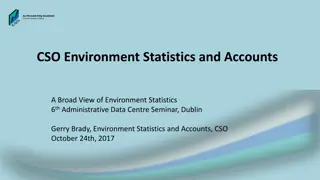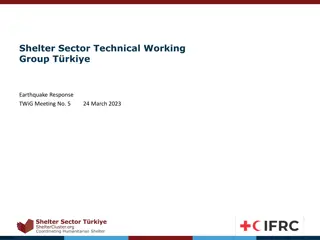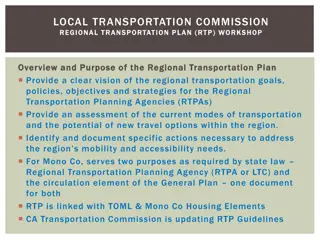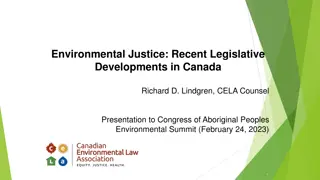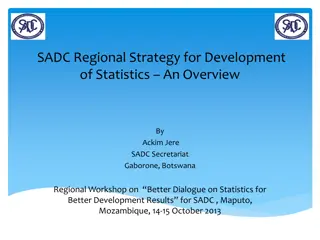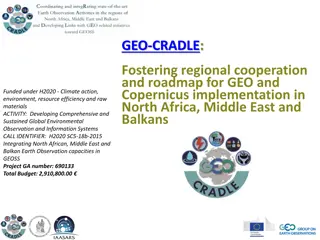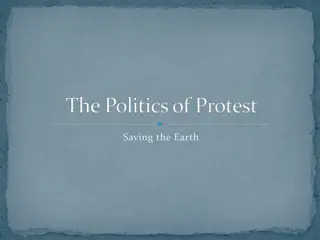Regional Action Plan for Environmental Defenders - Presentation Working Group
This presentation introduces the development of a regional action plan for environmental defenders in Chile, Ecuador, and Saint Kitts & Nevis. It includes key objectives, strategies, and proposals discussed to support human rights defenders in environmental matters.
Download Presentation

Please find below an Image/Link to download the presentation.
The content on the website is provided AS IS for your information and personal use only. It may not be sold, licensed, or shared on other websites without obtaining consent from the author.If you encounter any issues during the download, it is possible that the publisher has removed the file from their server.
You are allowed to download the files provided on this website for personal or commercial use, subject to the condition that they are used lawfully. All files are the property of their respective owners.
The content on the website is provided AS IS for your information and personal use only. It may not be sold, licensed, or shared on other websites without obtaining consent from the author.
E N D
Presentation Transcript
UNEP Evaluation of 10YFP Project Secretariat Activities Design and management Baseline for measuring progress missing at start of project (subsequently developed through Global SCP Survey) Umbrella project is underfunded and project staff are stretched Relevance Highly relevant, reinforced by adoption of SDGs, esp SDG 12 Relevance is high for all major stakeholders but some partners would like to see closer link to climate change action Project well aligned to UNEP MTS and EU s SCA and GPGC Effectiveness 10YFP is facilitating implementation, mainstreaming and scaling up of SCP at all levels 10 Trust Fund projects were under implementation now 33 Good cooperation with SWITCH Asia I
UNEP Evaluation of 10YFP Project Secretariat Activities Efficiency Efficient secretariat, high quality outputs, on limited resources Potential synergies with other UNEP activities not always tapped Some but not all relevant UN Agencies engaged in the six programmes Relatively complex governance structure and project screening processes latter has been streamlined since evaluation Sustainability Too early to assess sustainability and replication of initiatives launched so far Socio-political sustainability assessed as strong, with SDG 12 as a strong driver, Secretariat having contributed to its formulation
UNEP Evaluation of 10YFP Project Secretariat Responses Design and management Baseline and indicator framework fully established (2017) and delivering results to measure and enhance implementation Mid-term review underway now will develop 2018-22 strategy Relevance and efficiency 10YFP indicator framework closely linked to SDG indicators UN Environment developing IGE & SCP collaboration and synergies Programmes will continue to evolve, following co-leads and MAC, and guidance of Board and HLPF (esp 2018) and mid-term review Effectiveness and sustainability Indicator framework fully developed enabling reporting to HLPF 2017 strong link to multiple SDGs allows holistic assessment NFP toolkit translated into 3 languages, to be used in capacity building webinars/workshops with NFPs and others Evaluation recommendations shared with Board (May 2017)
UNEP Evaluation of PAGE Project Findings PAGE has achieved a lot in a short amount of time with limited funding Strategic relevance (Highly Satisfactory): Potential to support the SDG process and also to fill a coordination gap in integrated policy design and implementation. Effectiveness: significant achievements at output level, all countries are expected to achieve their direct outcomes with the exception of Ghana, PAGE is on track and impact is moderately likely . Sustainability and Replication: leveraged finances is a clear achievement, there are some examples of replication (e.g. China) and country ownership is strong, the ability to leverage necessary resources and to work with all relevant ministries remains unclear.
UNEP Evaluation of PAGE Project Findings (cont.) Efficiency: very good coordination, PAGE is an efficient example of joint UN Delivery, but delays in disbursements affected efficiency at country level Preparation and readiness: project design was assessed as being of high quality Stakeholder participation and country ownership: positive, a decision on Ghana may be necessary as well as stronger private sector and civil society engagement. Financial planning and management: delays and short term funding cycle by funding partners (Trust Fund option)
UNEP Evaluation of PAGE Project Findings (cont.) Project implementation and management Global governance is positive (effective cooperation), Secretariat draws heavily on UN Environment resources, need to ensure stable staff and plan for expansion Country level review highlights importance of stable presence and role of national coordinators, evidence of disruption due to disbursement problems
UNEP Evaluation of SWITCH Asia I Project Purpose Provide evidence of results to meet accountability requirements Promote operational improvement, learning and knowledge sharing from results and lessons learned UNEP + partners Strategic relevance and design Clearly justified given need to address sustainable use of resources and changes in consumption patterns in Asia Well designed but clarifications to guide implementation needed, including quantified performance targets, clear roles and responsibilities of RPSC and project stakeholders Outputs Quality of technical outputs is satisfactory overall Regional outputs more diverse and mature than national ones Need more systemic and long-term capacity building
UNEP Evaluation of SWITCH Asia I Project Effectiveness Policy dialogues at regional and national levels are taking place but with limited engagement of Ministries beyond Environment RPSC has provided notable contributions to raising awareness and understanding of SCP Efficiency Project was timely in preparing region for the adoption of the 10YFP in 2012 and the SDGs in 2015 Transition from IMIS to UMOJA has posed a substantial challenge Early detailed country needs assessments enabled RPSC to build on existing and planned activities Sustainability Results will require further efforts to be sustained RPSC could not yet be considered as catalytic
UNEP Evaluation of SWITCH Asia I Project Key recommendations RPSC should adopt a more results-driven approach: RPSC activities and outputs require a coherent and plausible pathway to the results, and improved articulation of logic. Engagement beyond environmental ministries is critical to make an impact: policy support on SCP needs to go beyond environment-related policies and RPSC should engage other ministries, especially that of Planning (for the SDGs). Emerging opportunities from SDGs to strengthen and synergise RPSC: adoption of Agenda 2030 and SDGs make SCP a priority for international, regional, and national government agencies. RSPC should further align its work with SDGs. Alignment of RPSC and SCP policy in Asia with 10YFP: continue creating synergies between 10YFP and RPSC initiatives at regional and country level, and complementary UNEP initiatives such as PAGE. This alignment should still allow customised and adaptive regional and national policy support .
SWITCH-Asia 2 Regional Policy Advocacy Component Key outcomes Overall: Governments and other stakeholders in Asia Pacific implementing sustainable growth models and policies for inclusive green economy, pollution control and climate change mitigation Number of SCP policy and instruments updated, designed, implemented by relevant stakeholders [Baseline 0; Target 4] Number of countries with SCP National Actions Plans or SCP mainstreamed in national policies, poverty reduction strategies and sustainable development strategies [Baseline 0; Target 4] SCP regulatory framework advocated at regional, sub-regional and national levels, reported against SDGs, and shared globally Uptake of SDG 12 and SCP related policies supported and demonstrated at regional, sub-regional and national levels
